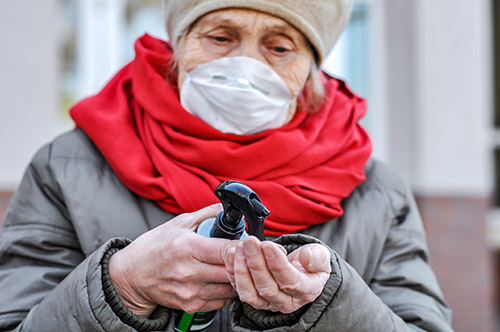



Greetings all. Your caring staff here at Gateway Gardens Assisted Living & Memory Care here in Bethlehem are fully aware that this is the third pandemic-related blog post in a row. Rest assured we’ll move on soon enough to more uplifting messaging, but we can’t turn our head to the fact that defending against this pandemic is our number one priority.
Below, we offer a number of insights for you at-home care givers, some of which most of us by now are fully aware of and implementing, other things that maybe you haven’t given thought to do. Rest assured that these are things being implemented within both our assisted living and memory care communities. Regardless whether you’re a Manor Lake resident, family member, or neither, you’re all precious members of our community and we will always do our part to help out in any way we can. So here you go:
Caring for a Senior at Home During a Pandemic
1. Frequent handwashing: One of the best ways to prevent getting sick is to wash your hands in hot, soapy water throughout the day. This guide from the Centers for Disease Control and Prevention outlines a 5-step process for proper handwashing.
2. Use hand sanitizer: While hot water and soap will always be the best option, hand sanitizer can help when you are out in public and don’t have access to a restroom. Choose one that contains at least 60 percent alcohol.
3. Don’t touch your face: Most people don’t realize how many times an hour they touch their face until they try not to do so. A quick rub of the eye or a scratch on the nose happens more often than you think. If you’ve been exposed to a virus and have it on your hands, touching your face can easily transfer the bug.
4. Take good care: A healthy diet combined with exercise and a good night’s sleep help keep your immune system strong. That’s vital for fighting off viruses of all kinds.
5. Limit public activity: Social distancing is another important step in protecting a senior family member from COVID-19 and other viruses. To the extent that you can, avoid going out in public while viruses are spreading. Utilize services like home delivered meals, drive-through pharmacies, and online shopping wherever possible.
6. Screen all visitors: Be vigilant about limiting who can visit your home or the home of your loved one during this time. People who are out in public may be carrying the virus and not showing any symptoms. By allowing others into your home, you are placing yourself and your loved one at risk.
7. Explore virtual physician visits: If a senior has a routine medical appointment scheduled, call the physician’s office. Many doctors are moving to virtual visits until the pandemic is under control.
Supporting a Loved One When You Can’t Be There
If your aging parent or another senior loved one resides in an assisted living community, you may not be able to visit during an outbreak of the flu or a pandemic emergency. This can be stressful for all involved. Finding ways to stay connected can help keep everyone’s spirits up.
Here are a few suggestions for doing so:
Dementia and COVID-19
According to the Alzheimer’s Association, having dementia doesn’t increase a person’s risk for contracting COVID-19. However, some behavior-related issues linked to dementia might. Also, because people with dementia are typically older, their odds of getting the virus are higher.
One risk for those who experience memory loss is that they may forget to wash their hands or refrain from touching their face. Both are known risk factors for viruses of all types.
Another complicating factor is if a senior with dementia has lost or impaired verbal skills. They may be unable to communicate that they have a headache or are experiencing chest pain, two symptoms of COVID-19.
Here are a few suggestions that may help you lower your family members risk for the illness:
Stay Updated on the COVID-19 Pandemic
Finally, learning more about COVID-19 and staying informed about changes in the state of the pandemic is important. While it’s not necessary to watch the news stations around the clock, staying updated on new information is a method of self-protection.
Here are two resources you can turn to for novel coronavirus education and updates:
Most states and local governments also share frequent updates on the pandemic. Call your local officials to learn more.
If you or a family member is a resident of Gateway Gardens Assisted Living and Memory Care here in Bethlehem, please know that we actively welcome your calls so that we can personally reassure you of the steps we are taking to keep residents and team members safe.
© 2025 Gateway Gardens at Bethlehem
Web/Marketing Solution Developed and Maintained by WSI Pro Marketing.